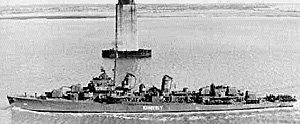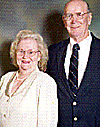Discharged
The Bougainville was badly damaged in a typhoon off Okinawa. During the storm, the airplanes tied to the flight deck got so loose that they called for volunteers to try to get them secured. The effort was unsuccessful. Many of the planes turned upside down on the flight deck, and aviation fuel poured down in the living quarters. The smoking lamp was out for a very long time after that! Fortunately there was no fire.
The storm was unbelievable; we took a 35-plus degree list. I was on the bridge and could look across the flight deck into the ocean on the other side of the ship. That's when the flight deck fell down over the bow of the ship. During the storm I suffered my worst injury of the war: a broken ankle that still causes me to limp. I was still lucky.
We returned to the states for repair and, as a result, we weren't there for the final surrender. We were near Guam on the way back out to the fight when the news came of the nuclear bombing of Hiroshima and, a day later, of Nagasaki. I know that those bombings were the end of it all and that many American lives were saved by the action, and I was glad of it at that time. However, in retrospect, I now feel we left a terrible legacy for generations to come with the mishandling of the waste from the reactors and with the bomb itself being available to warlords and whoever else in the world. We were not all that good a generation!
After the Peace was signed, the Bougainville sailed to Tsingtao, China, with some troop ships to take the Japanese garrison there. They capitulated immediately, and we had some great shore leave there while waiting to sail HOME!
I was actually a first-class seaman when I left the Navy, but I was still doing signals due to an unfortunate comment made in the dark on the bridge about the signal officer, which the executive officer overheard. This has little to do with the war and more to do with my big mouth! However, unless you were a criminal in the Navy's eyes, you continued at your job with a reduction in pay and perhaps a hundred hours of extra duty.
 Arriving home.
Arriving home.
I was discharged in November 1945 under a point system that allowed people with more overseas duty to go home earlier than the people who were on shore duty in the United States. It was possible to have plenty of points to go home, but if you were in the Marshall Islands, they weren't going to send you home until your ship arrived in the States. I was home within a few weeks of the bombings, and that made me happy.
After the War
I spent 37 years working on ships loading cargo to go all over the world, and I have a militant nature when I believe a thing is wrong. I'll still go down fighting for what I believe in! After the war, when steel splinters were still coming to the surface of my skin, I became somewhat of a rebel and later became very active in the trade union movement, which I still am even though I'm retired.
 Mr. & Mrs. Everett Richardson
Mr. & Mrs. Everett Richardson
I bungled my first marriage badly but have now been married to my second wife for 46 years; we have six children (five sons and one daughter) and one great-granddaughter. I'm very happy that none of my sons had to serve in any branch of the military, and I hope the world can find some way to iron out its differences without any kind of police action or outright war! I can't help thinking that there must be something wrong with a governmental system that must have a war going somewhere in the world to have real prosperity.
Looking back on it as a man of 74, the Navy would have done well to prepare us all a bit better for the real world. Remember we were scared kids and not heroes. The only heroes I knew were either breaking the rules recklessly or were completely out of their head and threw their lives away needlessly. War is a sad way to solve a problem.
Editor's Note
When Julie Olson, the editor of the Mensa Bulletin, asked me to write a piece on the Military History SIG in 1999 she commented that she knew little about military history but liked Cry "Havoc!"
I met Ev Richardson through my father, also a tin can sailor and a naval veteran of the Kimberly and the USS Ross. Ev is computer literate — as a signalman should be — and he and I have exchanged quips and barbs by e-mail for a couple of years.
The idea for this article came about because I realized that literally a thousand veterans of World War II were passing away everyday. As a historian I was acutely aware that we were also losing a lot of the common day to day information about life and service during that war and that era that could not be recaptured. It is these stories that form the underpinning of the grander stories of Normandy and the battle of Midway. The details of everyday life are their essence.
So I decided to ask a woman who knew little about warfare or tactics, but was an excellent writer, to talk to a man about events and experiences that might have seemed ancient history to her. I got exactly what I was hoping for — the story of a person at war. Military history is not just about battles and leaders and the development of weapons. It is about men and women doing what they need to do for whatever reasons they do it. Even when, as Ev says "many of us were resigned to the fact that it was only a matter of time — we weren't going to survive the war." — DWT
More Everett Richardson: WWII Oral History
- WWII Veteran Richardson: Introduction
WWII Veteran Richardson: Join the Navy, Basic Training
WWII Veteran Richardson: Signal School, First Assignment
WWII Veteran Richardson: At Sea, At War
WWII Veteran Richardson: Discharged, Post-War Years
WWII Veteran Richardson: USS Kimberly DD-521 Statistics
WWII Veteran Richardson: USS Kimberly World War II Service
WWII Veteran Richardson: In Memory of Our Departed Shipmates DD 521
Back to Cry Havoc #30 Table of Contents
Back to Cry Havoc List of Issues
Back to MagWeb Master Magazine List
© Copyright 2000 by David W. Tschanz.
This article appears in MagWeb (Magazine Web) on the Internet World Wide Web. Other military history articles and gaming articles are available at http://www.magweb.com